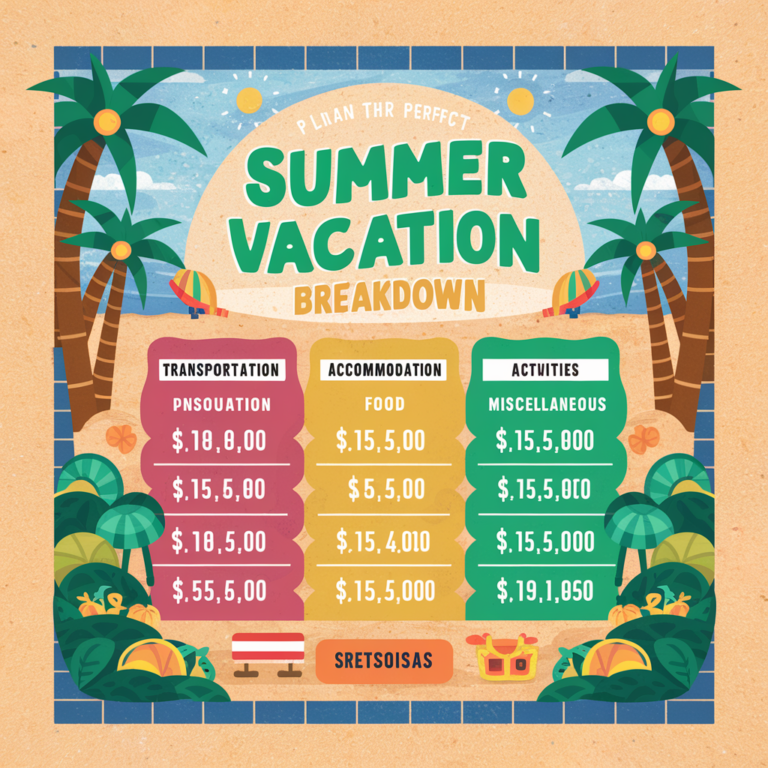Why is so important to create a perfect budget? The importance of managing your funds is more significant than ever in the fast-paced world of today. A well-designed budget may protect you from unforeseen financial disasters while also assisting you in reaching your financial objectives and securing your future. Making a foolproof budget is the basis for economic success, regardless of whether your goals are to pay off debt, save for a dream vacation, or establish an emergency fund. This detailed guide will explain how to create a perfect budget that will stand up to any financial hardship you may encounter.
How to Create a Perfect Budget? Simple Steps
1.Set Clear Financial Goals
Before getting into the weeds of budgeting, it’s critical to establish your financial objectives. Your goals will act as the budget’s compass, guiding you in allocating funds to the things that are most important to you. List both short-term and long-term goals from the outset. These could consist of:
Credit card debt repayment
If you have high-interest debt, pay it off as soon as possible.
Building an emergency fund
An emergency fund is essential because it provides a safety net for unforeseen costs.
Saving for retirement
Putting money down for retirement accounts will help you prepare for your elder years.
Buying a home
If owning a home is a goal, figure out how much you’ll need for a down payment.
Travel
Set aside money for travel, whether a dream vacation or just seeing the world.
Education
Consider the associated costs if you or your children plan to pursue higher education.
Investing
Set aside money to increase your wealth through investments.
Giving to charity
Include philanthropy in your spending plan to support causes that are important to you.
Keep in mind that SMART goals are those that are specific, measurable, achievable, relevant, and time-bound. It will be simpler to distribute your resources efficiently if you have defined objectives.
2.Calculate Your Income
Identifying your entire monthly revenue is the next step. This includes your salary, any earnings from side jobs or freelancing, rental income, and any other regular sources of revenue. Use your net income, which is the sum that remains after taxes and other deductions. Calculating an average based on the previous several months is a brilliant idea if your revenue varies from month to month.
3.Track Your Expenses
It’s time to understand exactly where your money is going. Start by keeping a record of your spending for at least a month. You can use spreadsheets, financial software, paper, and pen. Sort your spending into fixed and variable categories:
Fixed Expenses
Fixed expenses are ongoing costs that don’t significantly change from month to month. They include utility costs, rent or a mortgage, insurance premiums, and loan payments.
Variable Expenses
Variable expenses are those that can change from month to month. They include fees for food, dining out, entertainment, travel, and other costs.
Irregular Expenses
Remember those less frequent but essential expenses, such as yearly subscriptions, auto upkeep, or holiday gifts. To include these in your monthly budget making, divide these by 12.
By keeping track of your expenditures, you can spot trends and areas where you might be overspending. It’s also a chance to decide where you may make savings to have more money for your financial objectives.
4.Create Your Budget
It’s time to build your budget now that you have a firm grasp of your objectives, revenue, and outgoings. Start by deducting your monthly income from all of your costs. The aim is to have a surplus to put toward your financial objectives. How to set up your budget is as follows:
Essentials
A percentage of your salary should be set aside to pay for necessities like housing, utilities, groceries, transportation, and insurance. Your main priority should be to do this.
Repaying bills
Suppose you have unpaid bills. Set aside some of your surplus to pay them off. Pay attention to high-interest accounts initially.
Investments and Savings
Allocate a percentage of your excess for investments and savings. Your emergency fund, retirement accounts, and other financial instruments fall under this category.
Non-Essential Spending
Set aside a percentage of your surplus for non-essential purchases like hobbies, entertainment, and dining out. This guarantees that you can live a fulfilling life while pursuing your objectives.
Irregular Expenses
Save a portion of your excess for the unanticipated costs you discovered when keeping track of your spending.
Keep in mind that your spending plan needs to be flexible and adjustable. It’s a suggestion rather than a rigid rule. Because life can be unpredictable, your build budget should allow for unforeseen costs or adjustments to your financial condition.
5.Monitor and Adjust
Making a budget is the first step; maintaining it over time is the real difficulty. Keep track of your spending and compare it to your budget frequently. To make this procedure more accessible, you can use applications or spreadsheets. Here’s how to make sure your budget is impenetrable:
Continual Check-Ins
Review your developed budget every month or every three months to gauge your progress. Do you spend too much money in some categories? Are your goals being met on schedule?
Adjust as Necessary
Your budget should evolve as your circumstances do. Adjust your budget if your goals change, your income rises or falls, or both.
Maintain Your Emergency Money
Make sure you have emergency money. It serves as your financial safety net, so you should replenish it if you ever use some of it.
Maintain Your Discipline
Maintaining your discipline is essential for a creating a successful budget. Find techniques to reduce impulsive spending while maintaining goal focus.
6.Seek Professional Advice
Consider consulting a financial counselor if you need help with budgeting or have complicated economic issues like investments, taxes, or estate planning. They can offer individualized advice to support you in making wise financial decisions and ensuring that your spending plan aligns with your long-term objectives.
Conclusion
A crucial first step to establishing financial security and achieving your goals is to create a perfect budget. You can take charge of your finances and strive toward a better financial future by defining specific goals, keeping track of your income and expenses, and creating a realistic budget. Budgeting is not about deprivation; instead, it is about wise resource allocation to allow you to enjoy today while protecting tomorrow. Budgeting now will help you achieve your financial objectives.





